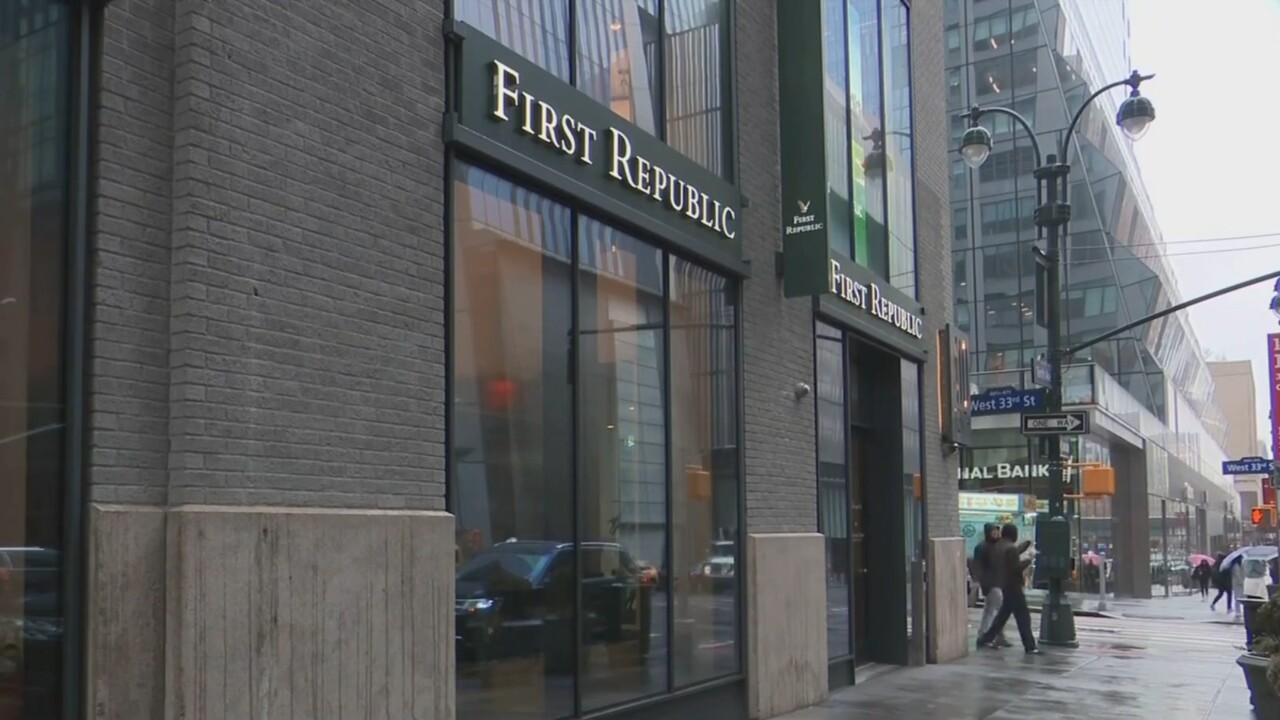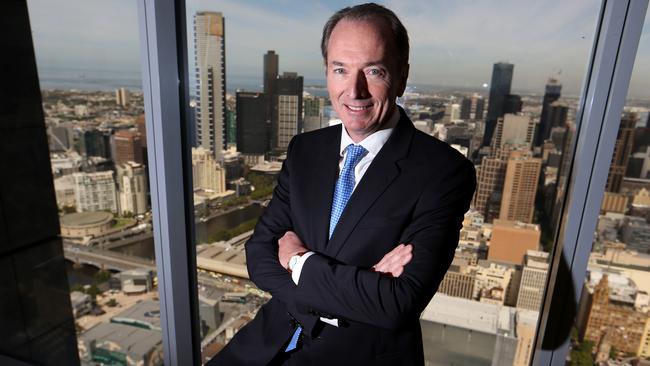Bank crisis is a warning shot but the industry’s resilient, says Morgan Stanley’s James Gorman
The Australian boss of one of the biggest Wall Street banks says the rising interest rate cycle is almost at an end and the chance of a recession is lessening, as long as banks take risk seriously.

Business
Don't miss out on the headlines from Business. Followed categories will be added to My News.
Morgan Stanley chief executive James Gorman said the banking crisis across US and Europe should act as a “warning shot” for boards and management as well as regulators to ensure they were prepared for any further unforeseen economic or geopolitical shocks.
But the boss of one of Wall Street’s biggest banks has played down the prospect of a banking crisis escalating, declaring his industry is “resilient” and has coped well with rapidly rising interest rates.
The New York-based CEO of one of the big four US banks said recent high-profile problems at banks such as Europe’s Credit Suisse and California’s Silicon Valley Bank have been caused “largely through self-inflicted wounds”.
Melbourne-raised Mr Gorman is the one of the longest-serving CEOs on Wall Street, having been the boss of the $US145bn ($216bn) global banking giant since 2010.
Mr Gorman returns to Australia next week to deliver the first Sir Keith Murdoch Oration in four years at the State Library Victoria on Tuesday, April 4.
In an interview with The Weekend Australian, Mr Gorman acknowledged that the market and world economy was “uncertain” at present but thought the cycle of interest rate rises was nearing its end and that a sustained global recession was unlikely.
“I’m not a future teller (and) I don’t know exactly how things will evolve. I didn’t predict Silicon Valley Bank would implode. So you’ve got to approach it with a fair bit of humility, but just based upon what I see and what I see in our business I don’t think we’re in a crisis. And I don’t think the markets think we’re in a crisis,” Mr Gorman said.
“Long term, I’m very optimistic. Short term, I think we’re dealing with a period of uncertainty.
“We should all be open to some surprises, maybe some nasty surprises popping up like we’ve had the last few weeks. But that doesn’t mean that the whole global economy is in trouble.”
He said he would share his observations about the recent financial industry issues unfolding in the US and Europe, where First Citizens Bank has acquired much of failed mid-tier lender Silicon Valley Bank and Swiss authorities oversaw a quickfire merger between a struggling Credit Suisse and UBS.
His speech will also cover the geopolitical situation around the world from a business perspective and Australia’s place in it.

During an appearance this week before Senate politicians in Washington to discuss the failure of SVG and that of Signature Bank, Federal Reserve vice chairman for supervision Michael Barr described the failure of Silicon Valley Bank as a “textbook case of mismanagement”.
Both lenders were badly caught out after being over exposed to longer term interest rates.
However there have been fears their failures could cause contagion across the rest of the financial system, although federal regulators in the US have used emergency powers to guarantee depositors at the two banks that they would get their money back. A funding backstop has also been extended to all US banks.
“Right now we’ve seen banks fail, largely through self-inflicted wounds. So there’s nothing really wrong with the economy. There’s a lot wrong with the way those banks are adjusted to the interest rate realities that we’re in, which is a rising rate environment,” said Mr Gorman when asked about the risk of wider issues across banking.
“And the hope, and frankly my expectation, is that the acts of the government will have cauterised the bleeding so that we can keep moving forward.
“So I don’t think it’s a system-wide issue. But there definitely may be other instances. It’s possible there are other institutions who have issues but I do not believe it’s a systemic issue.
“It’s very, very different from the (global financial) crisis of 2008.”
Mr Gorman did say that the recent bank failures should serve as a “warning shot for boards and management in particular, and regulators and supervisors … to understand how their institution is going to perform if the environment gets much more challenging, and take actions to prepare themselves for that”.
“Hopefully they’ve been doing that,” he said.
While Mr Gorman said the banking sector and US economy has coped well with a series of interest rate rises in recent months, including an 0.25 percentage point increase in late March that Mr Gorman said he agreed with, the Morgan Stanley boss believes it likely that there will be fewer rate rises in the near future.
“I think we’re getting near the end of it for sure. Whether we’re at the end now, well I’d say it’s possible there’ll be one more increase,” he said.
“I think it’s unlikely there’ll be more after that.
“It’s also possible though there will be no more increases. I think it really depends on what the data shows in the next month or so but we’re clearly at the tail end of it. But it’s been a historic rate of increase.”
Mr Gorman told an investment conference last June that there was a 50-50 proposition the US would enter a recession, and at the time he said that strong balance sheets for corporations and consumers were a reason to be optimistic that any recession would not be deep or last for a long period.
He said he was “at the doveish end of the spectrum then … when most of us thought the possibility of recession was nearly certain” and now said “it doesn’t really matter” if a recession happens as long as it is a short one.
“It’s just two quarters of negative economic growth. It’s not going to change the world. It’s whether the recession is deep and lasting. If it’s short and shallow, it really actually doesn’t matter that much,” he said.
“So I don‘t know if we’re going to have a recession. I suspect not. I mean, my gut is still that we won’t. I could be wrong on that. But I’d be very surprised if it’s a deep and sharp recession.”
Mr Gorman pointed out that the economic data was still generally strong, as were trade figures and that the US had a situation of almost full employment with plenty of jobs available and a stockmarket that has essentially been flat this year.
“So we have interest rates of 5 per cent instead of zero. And that doesn’t quite reach the calibre of crisis in my mind. There are other people on TV all day talking about like we’re about to go into a Great Depression. I just don’t see it. I mean, I’m sort of guided by the facts and the facts don’t support it,” he said.
“Now, if unemployment were to spike up to 10 per cent or something like it did after the GFC, if inflation was running away, if you had massive home foreclosures – you know, like we’ve had a couple of times in my career here in the US, you have major banks imploding – then you’re in a different situation, but we haven’t really got that.”
Mr Gorman acknowledged that the commercial property sector could be one part of the economy to show weakness, with rising interest rates happening as valuations start to fall – with much of the commercial property held by regional US banks, some of which have been struggling.
“Will there be some damage in the commercial real estate sector? Unquestionably. Will it arise to the level where it challenges the creditworthiness of most banking institutions? I don‘t think so.
“Now, some of them are highly concentrated in that space. Signature Bank, which collapsed last week, is one of them, and there are some very real estate intensive institutions in this country. So there’ll be pockets (of issues) but I don’t see it as a fundamental collapse.”
Mr Gorman is bullish about the outlook for Morgan Stanley’s wealth management business, a strong focus of which has a career-defining mark on his tenure at the bank as he turbocharged that division while rivals stuck to a more traditional investment banking model such as deal-making and facilitating corporation transactions.
“That business is a phenomenal business that will keep growing and it’s not driven by people transacting day to day. It’s more clients with significant complicated wealth wanting estate planning advice, diversification advice, they want to set up intergenerational transfers,” he said.
“It has now reached a point where we’re managing the equivalent of about half of all the assets that are in the Australian financial sector. So it’s an incredibly diversified and enormous business. And I think it will continue to grow really nicely.”
Otherwise, Mr Gorman reiterated that the global economy has been noteworthy for its “resilience”, given the shocks it has had to withstand such as the Russian invasion of Ukraine, the pandemic, rising inflation and rapid interest rate increase.
“If I’d said two, three or four years ago that we’re going to have the first land war that we’ve had in Europe in seven decades, the biggest pandemic we’ve had in 100 years, the highest inflation in 40 years and the highest interest rate response to that in 40 years, and asked how do you think the world would look then most people would say it would look terrible. But it actually doesn’t,” he said.
“So it‘s either super resilient, or there’s a little fakery going on. So I think it’s pretty resilient.”
Originally published as Bank crisis is a warning shot but the industry’s resilient, says Morgan Stanley’s James Gorman



